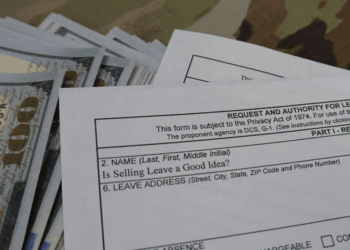It’s easy to get caught up in the excitement of the holiday season. However, many military families are already struggling with inflation rates and higher housing costs. When holidays approach, there’s a likely chance of increased spending … and increased debt.
According to a Lending Tree survey, one-third of Americans took on debt for holiday purchases in 2022, and that debt averaged $1,550 per consumer. Total spending increased 24% from 2021, partially because of higher inflation rates.
To get a handle on holiday budgets, professional broker Phil Jawny, CEO of GoVA — a company focused on empowering service members to make smart financial decisions, shares advice on managing holiday spending.
More strategy, less emotion
Letting emotions control your holiday spending is a recipe for going into debt. Instead, Jawny suggests a more strategic approach.
“Look back before you go forward. Understand where you are so you know where you want to go,” he said.
He encourages everyone to review the past few months of credit card statements to see what you are currently spending money on. Maybe you’ll find ways to cut back or swap out prior expenses for holiday spending. You must have a handle on your real budget numbers before the holiday spending begins.
Get the full picture
Many people base their holiday budget on what they spent last year or the number of people on their list. Jawny recommends a more complete approach to get a true snapshot of your spending abilities.
“Start by zooming out and looking at your fixed costs every month: mortgage, rent, utilities, student loans, auto loans, etc. Then ask, ‘how much money in total do we want to spend on holidays?’” he said.
Once you and your spouse have discussed the big picture of your spending abilities, work together to break up the overall budget into gifts or other items you want to buy.
Be smart about credit card debt
Many Americans spend the first five months of the following year paying off credit cards from the holidays. If you only make minimum payments, you will carry that debt forever. Before using credit cards, you need a plan for paying them off.
To avoid months of stress and debt, Jawny says, “If you’re going to use credit cards, have a game plan. Make sure your card generates points or discounts for travel. Cash in those cash-back bonus options to pay down the card balance.”
If you overspend, get back on track
If you find yourself in debt from holiday spending, take steps to get unstuck.
“The revolving debt from credit cards is quicksand. The way to get out is debt consolidation, which gives you an installment plan with a lower interest rate and a fixed term,” Jawny said.
A debt consolidation loan is one way to lower your interest rates so your monthly payments go farther, and you can get out of debt sooner. If you have good credit, you can do a 0% balance transfer to new credit cards. Just remember to cut up your old cards because you do not now have double spending power.
Another option is an interest-free loan through the financial relief organizations associated with the military service branches: Army Emergency Relief, Navy-Marine Corps Relief Society, etc.
If you follow these tips, you’ll be able to build a reasonable holiday budget, keep your spending within your means, and make a plan for paying down credit card debt. When you can enjoy the holidays and stay on track with budgeting, your holidays are sure to feel merry and bright.









































